Report: Sustainable and Responsible Tourism Management in Scotland
VerifiedAdded on 2023/01/05
|17
|5503
|86
Report
AI Summary
This report provides a comprehensive analysis of sustainable and responsible tourism management, focusing on the case of Scotland. It begins with an executive summary and introduction, defining the core concepts of sustainable and responsible tourism and exploring their evolution over time. The report examines the roles and functions of leading global organizations like the World Tourism Organization in promoting sustainable tourism. It then delves into the principles of tourism development and planning, emphasizing the importance of minimizing adverse effects and integrating sustainability into tourism practices. The study evaluates the impacts of tourism from social, environmental, economic, and cultural perspectives, and analyzes how specific tourism businesses meet stakeholder requirements. The report also examines the contribution of various stakeholders in developing sustainable tourism practices and concludes with an evaluation of how sustainability is being managed in different tourist destinations worldwide, critically assessing the success or failure of these approaches. The report emphasizes the importance of responsible tourism and its benefits for both the environment and the local communities. The report also provides an overview of how the destination has implemented various strategies to ensure long-term sustainability.
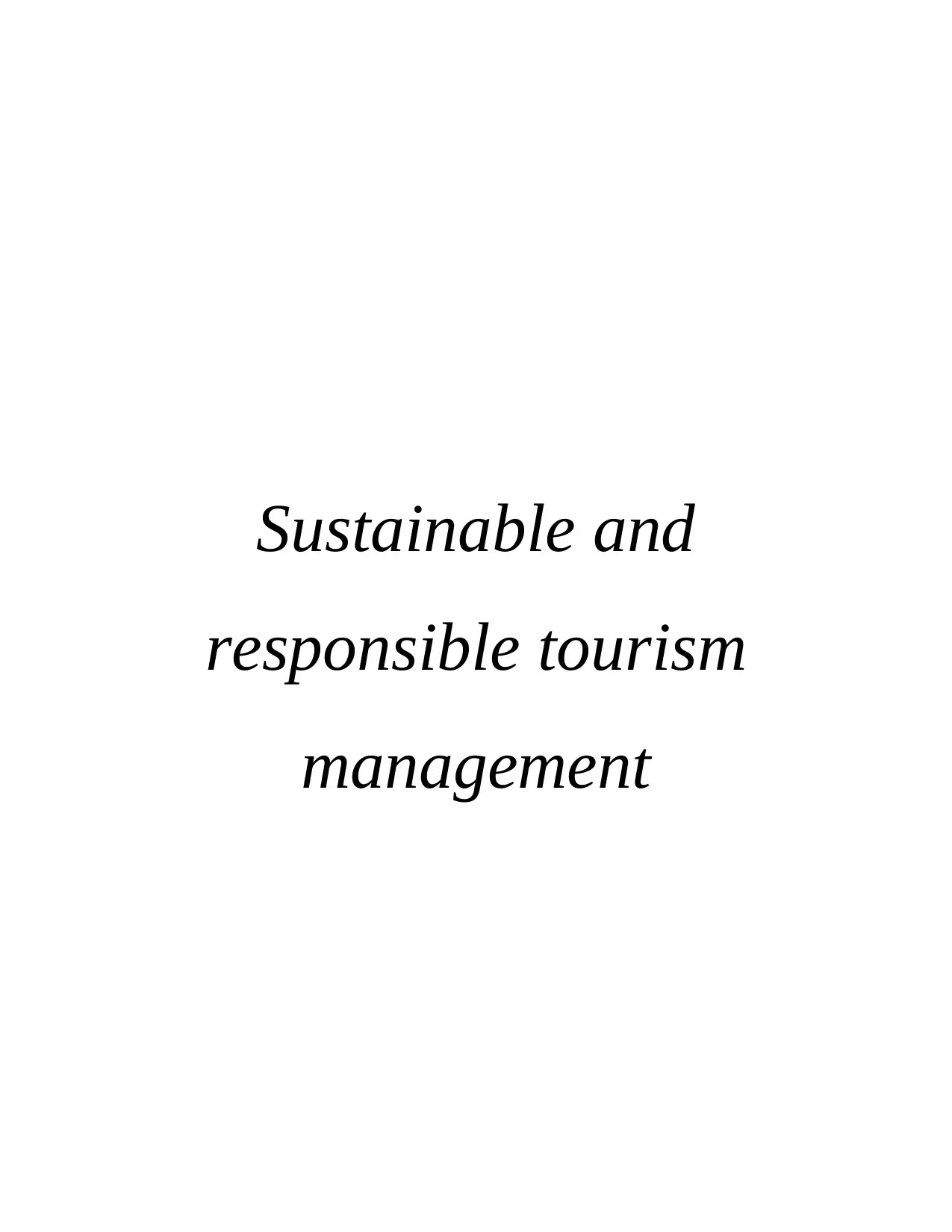
Sustainable and
responsible tourism
management
responsible tourism
management
Paraphrase This Document
Need a fresh take? Get an instant paraphrase of this document with our AI Paraphraser
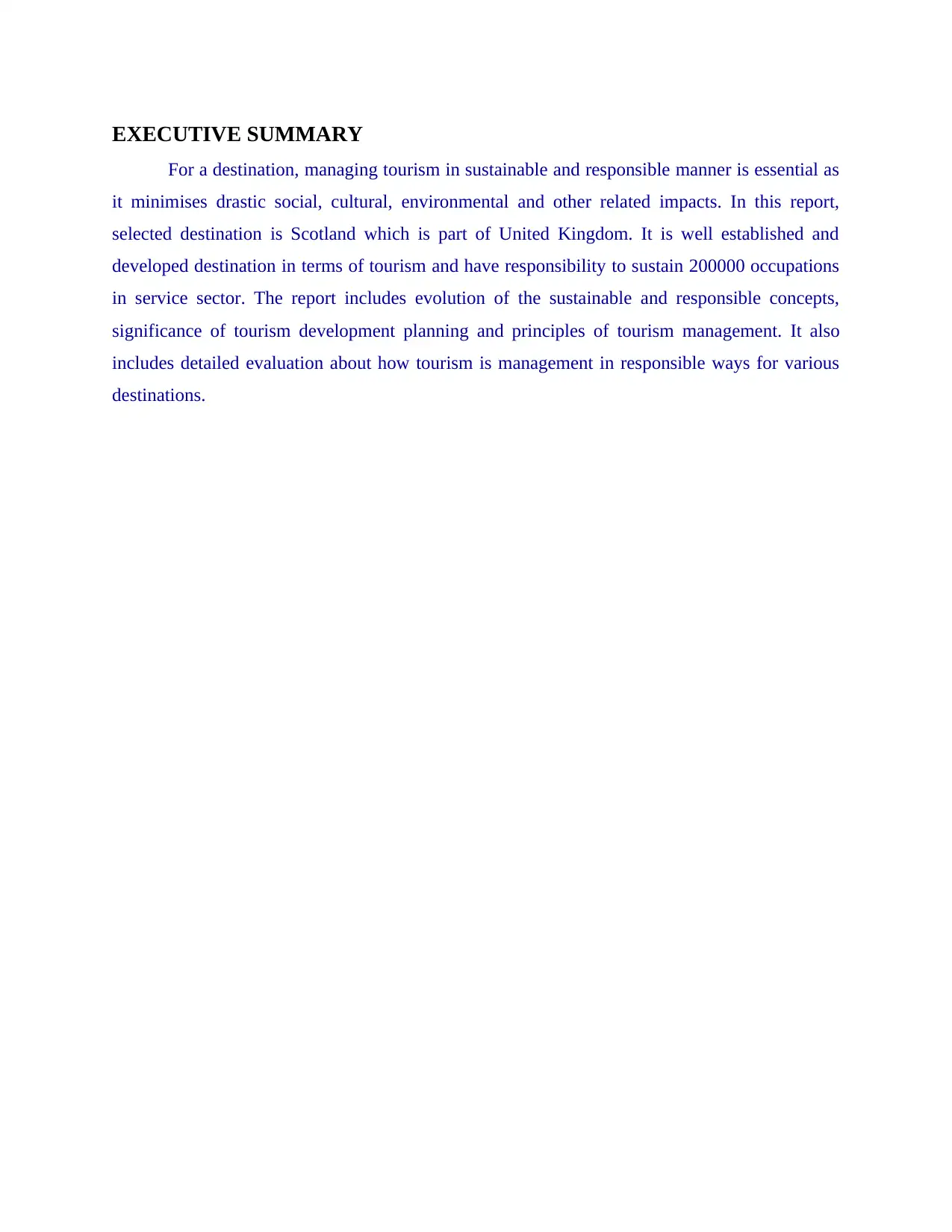
EXECUTIVE SUMMARY
For a destination, managing tourism in sustainable and responsible manner is essential as
it minimises drastic social, cultural, environmental and other related impacts. In this report,
selected destination is Scotland which is part of United Kingdom. It is well established and
developed destination in terms of tourism and have responsibility to sustain 200000 occupations
in service sector. The report includes evolution of the sustainable and responsible concepts,
significance of tourism development planning and principles of tourism management. It also
includes detailed evaluation about how tourism is management in responsible ways for various
destinations.
For a destination, managing tourism in sustainable and responsible manner is essential as
it minimises drastic social, cultural, environmental and other related impacts. In this report,
selected destination is Scotland which is part of United Kingdom. It is well established and
developed destination in terms of tourism and have responsibility to sustain 200000 occupations
in service sector. The report includes evolution of the sustainable and responsible concepts,
significance of tourism development planning and principles of tourism management. It also
includes detailed evaluation about how tourism is management in responsible ways for various
destinations.
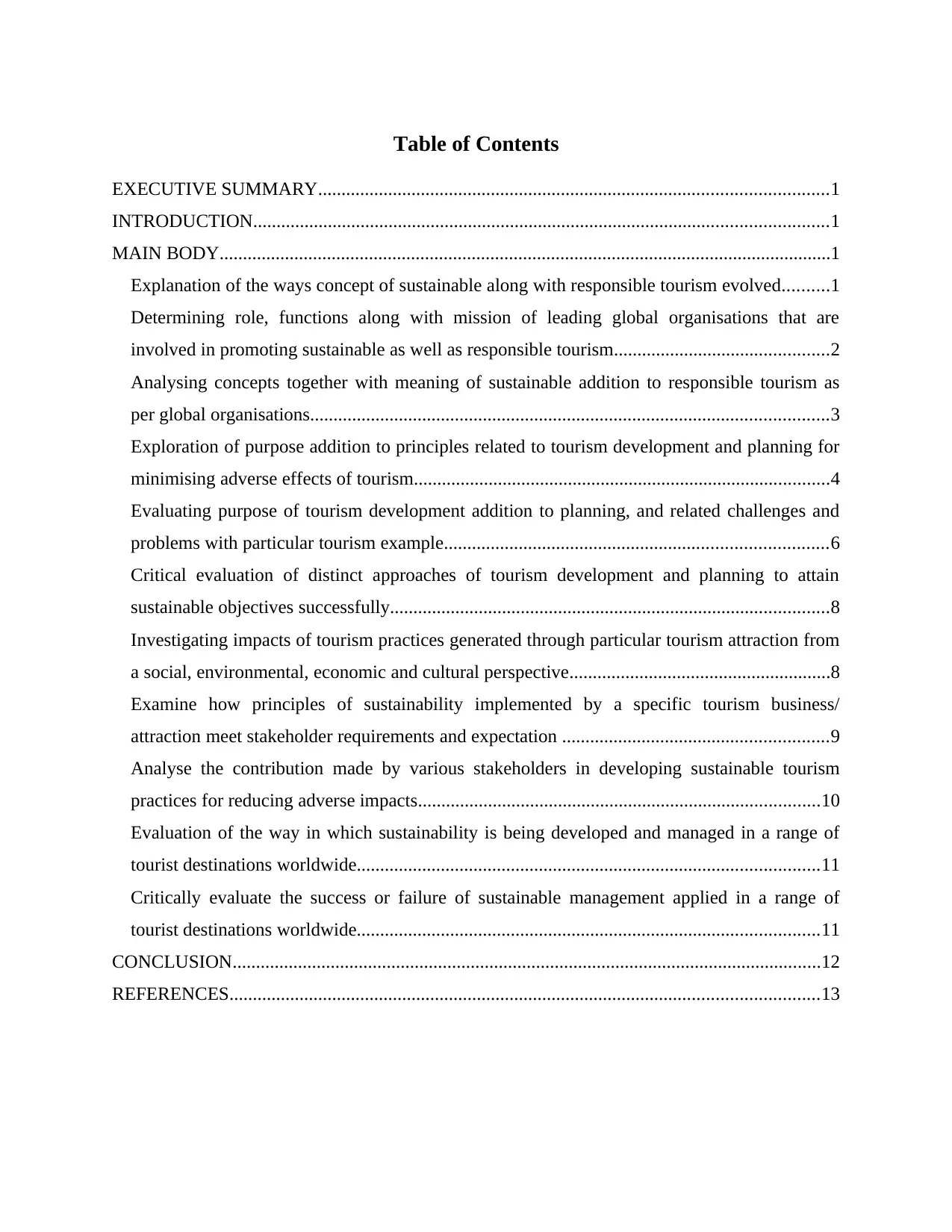
Table of Contents
EXECUTIVE SUMMARY.............................................................................................................1
INTRODUCTION...........................................................................................................................1
MAIN BODY...................................................................................................................................1
Explanation of the ways concept of sustainable along with responsible tourism evolved..........1
Determining role, functions along with mission of leading global organisations that are
involved in promoting sustainable as well as responsible tourism..............................................2
Analysing concepts together with meaning of sustainable addition to responsible tourism as
per global organisations...............................................................................................................3
Exploration of purpose addition to principles related to tourism development and planning for
minimising adverse effects of tourism.........................................................................................4
Evaluating purpose of tourism development addition to planning, and related challenges and
problems with particular tourism example..................................................................................6
Critical evaluation of distinct approaches of tourism development and planning to attain
sustainable objectives successfully..............................................................................................8
Investigating impacts of tourism practices generated through particular tourism attraction from
a social, environmental, economic and cultural perspective........................................................8
Examine how principles of sustainability implemented by a specific tourism business/
attraction meet stakeholder requirements and expectation .........................................................9
Analyse the contribution made by various stakeholders in developing sustainable tourism
practices for reducing adverse impacts......................................................................................10
Evaluation of the way in which sustainability is being developed and managed in a range of
tourist destinations worldwide...................................................................................................11
Critically evaluate the success or failure of sustainable management applied in a range of
tourist destinations worldwide...................................................................................................11
CONCLUSION..............................................................................................................................12
REFERENCES..............................................................................................................................13
EXECUTIVE SUMMARY.............................................................................................................1
INTRODUCTION...........................................................................................................................1
MAIN BODY...................................................................................................................................1
Explanation of the ways concept of sustainable along with responsible tourism evolved..........1
Determining role, functions along with mission of leading global organisations that are
involved in promoting sustainable as well as responsible tourism..............................................2
Analysing concepts together with meaning of sustainable addition to responsible tourism as
per global organisations...............................................................................................................3
Exploration of purpose addition to principles related to tourism development and planning for
minimising adverse effects of tourism.........................................................................................4
Evaluating purpose of tourism development addition to planning, and related challenges and
problems with particular tourism example..................................................................................6
Critical evaluation of distinct approaches of tourism development and planning to attain
sustainable objectives successfully..............................................................................................8
Investigating impacts of tourism practices generated through particular tourism attraction from
a social, environmental, economic and cultural perspective........................................................8
Examine how principles of sustainability implemented by a specific tourism business/
attraction meet stakeholder requirements and expectation .........................................................9
Analyse the contribution made by various stakeholders in developing sustainable tourism
practices for reducing adverse impacts......................................................................................10
Evaluation of the way in which sustainability is being developed and managed in a range of
tourist destinations worldwide...................................................................................................11
Critically evaluate the success or failure of sustainable management applied in a range of
tourist destinations worldwide...................................................................................................11
CONCLUSION..............................................................................................................................12
REFERENCES..............................................................................................................................13
⊘ This is a preview!⊘
Do you want full access?
Subscribe today to unlock all pages.

Trusted by 1+ million students worldwide
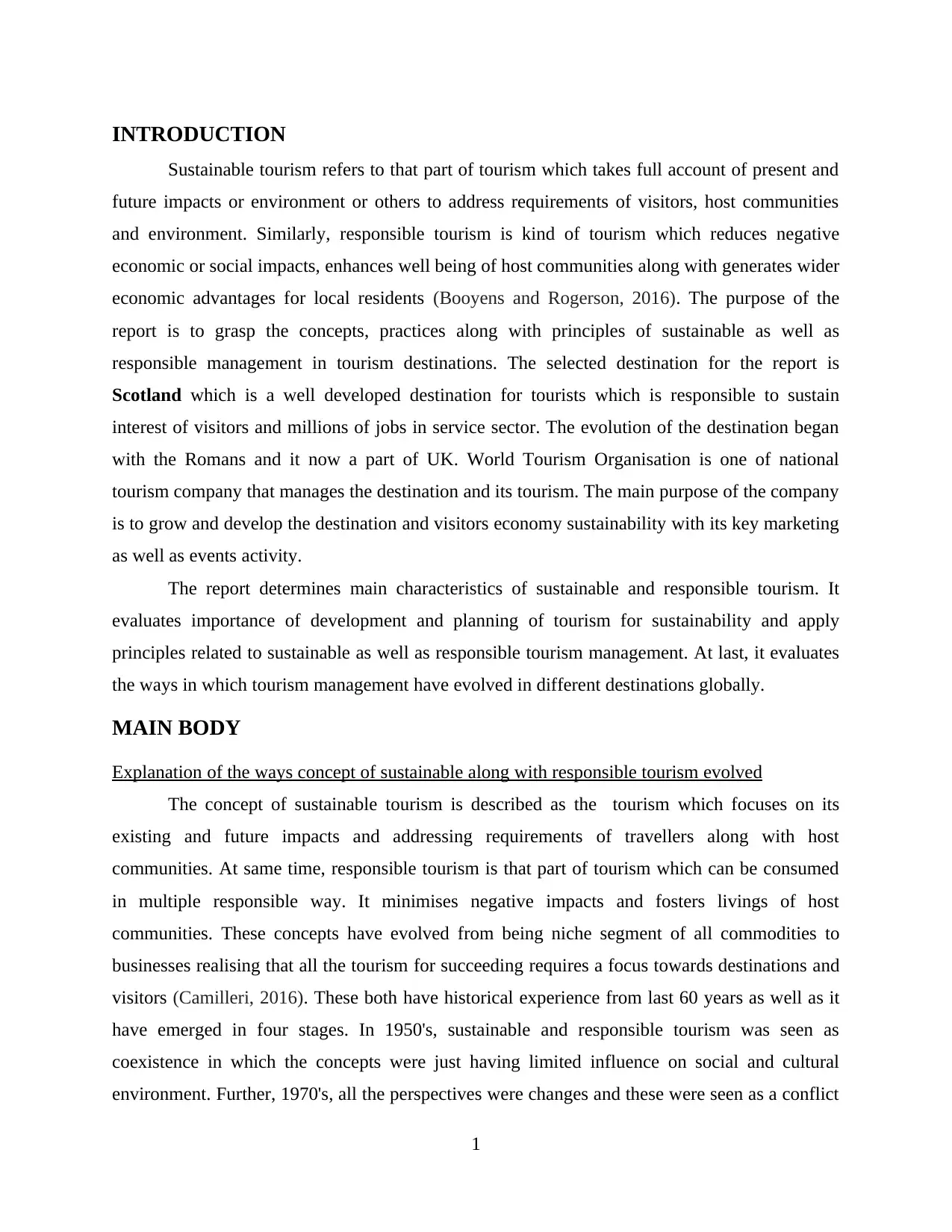
INTRODUCTION
Sustainable tourism refers to that part of tourism which takes full account of present and
future impacts or environment or others to address requirements of visitors, host communities
and environment. Similarly, responsible tourism is kind of tourism which reduces negative
economic or social impacts, enhances well being of host communities along with generates wider
economic advantages for local residents (Booyens and Rogerson, 2016). The purpose of the
report is to grasp the concepts, practices along with principles of sustainable as well as
responsible management in tourism destinations. The selected destination for the report is
Scotland which is a well developed destination for tourists which is responsible to sustain
interest of visitors and millions of jobs in service sector. The evolution of the destination began
with the Romans and it now a part of UK. World Tourism Organisation is one of national
tourism company that manages the destination and its tourism. The main purpose of the company
is to grow and develop the destination and visitors economy sustainability with its key marketing
as well as events activity.
The report determines main characteristics of sustainable and responsible tourism. It
evaluates importance of development and planning of tourism for sustainability and apply
principles related to sustainable as well as responsible tourism management. At last, it evaluates
the ways in which tourism management have evolved in different destinations globally.
MAIN BODY
Explanation of the ways concept of sustainable along with responsible tourism evolved
The concept of sustainable tourism is described as the tourism which focuses on its
existing and future impacts and addressing requirements of travellers along with host
communities. At same time, responsible tourism is that part of tourism which can be consumed
in multiple responsible way. It minimises negative impacts and fosters livings of host
communities. These concepts have evolved from being niche segment of all commodities to
businesses realising that all the tourism for succeeding requires a focus towards destinations and
visitors (Camilleri, 2016). These both have historical experience from last 60 years as well as it
have emerged in four stages. In 1950's, sustainable and responsible tourism was seen as
coexistence in which the concepts were just having limited influence on social and cultural
environment. Further, 1970's, all the perspectives were changes and these were seen as a conflict
1
Sustainable tourism refers to that part of tourism which takes full account of present and
future impacts or environment or others to address requirements of visitors, host communities
and environment. Similarly, responsible tourism is kind of tourism which reduces negative
economic or social impacts, enhances well being of host communities along with generates wider
economic advantages for local residents (Booyens and Rogerson, 2016). The purpose of the
report is to grasp the concepts, practices along with principles of sustainable as well as
responsible management in tourism destinations. The selected destination for the report is
Scotland which is a well developed destination for tourists which is responsible to sustain
interest of visitors and millions of jobs in service sector. The evolution of the destination began
with the Romans and it now a part of UK. World Tourism Organisation is one of national
tourism company that manages the destination and its tourism. The main purpose of the company
is to grow and develop the destination and visitors economy sustainability with its key marketing
as well as events activity.
The report determines main characteristics of sustainable and responsible tourism. It
evaluates importance of development and planning of tourism for sustainability and apply
principles related to sustainable as well as responsible tourism management. At last, it evaluates
the ways in which tourism management have evolved in different destinations globally.
MAIN BODY
Explanation of the ways concept of sustainable along with responsible tourism evolved
The concept of sustainable tourism is described as the tourism which focuses on its
existing and future impacts and addressing requirements of travellers along with host
communities. At same time, responsible tourism is that part of tourism which can be consumed
in multiple responsible way. It minimises negative impacts and fosters livings of host
communities. These concepts have evolved from being niche segment of all commodities to
businesses realising that all the tourism for succeeding requires a focus towards destinations and
visitors (Camilleri, 2016). These both have historical experience from last 60 years as well as it
have emerged in four stages. In 1950's, sustainable and responsible tourism was seen as
coexistence in which the concepts were just having limited influence on social and cultural
environment. Further, 1970's, all the perspectives were changes and these were seen as a conflict
1
Paraphrase This Document
Need a fresh take? Get an instant paraphrase of this document with our AI Paraphraser
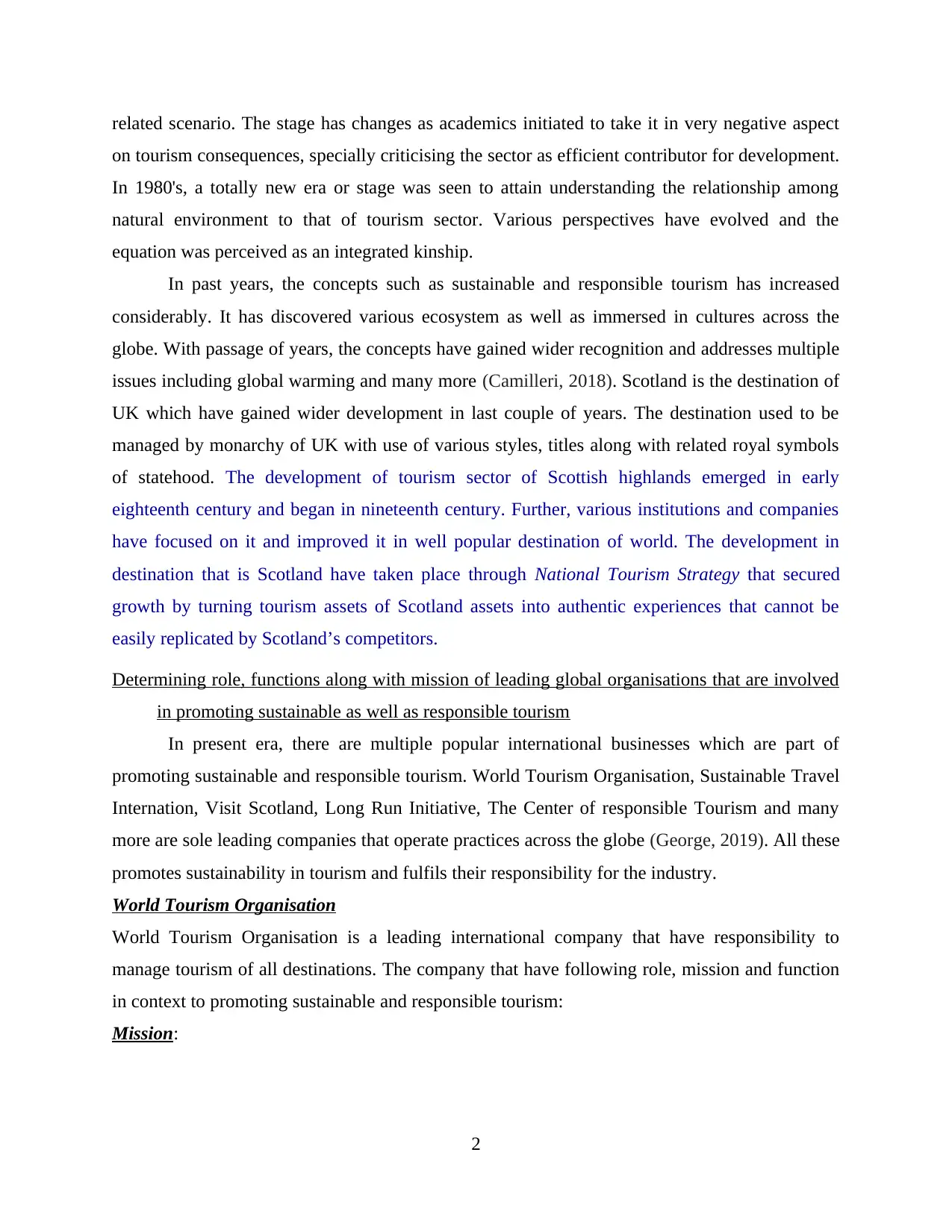
related scenario. The stage has changes as academics initiated to take it in very negative aspect
on tourism consequences, specially criticising the sector as efficient contributor for development.
In 1980's, a totally new era or stage was seen to attain understanding the relationship among
natural environment to that of tourism sector. Various perspectives have evolved and the
equation was perceived as an integrated kinship.
In past years, the concepts such as sustainable and responsible tourism has increased
considerably. It has discovered various ecosystem as well as immersed in cultures across the
globe. With passage of years, the concepts have gained wider recognition and addresses multiple
issues including global warming and many more (Camilleri, 2018). Scotland is the destination of
UK which have gained wider development in last couple of years. The destination used to be
managed by monarchy of UK with use of various styles, titles along with related royal symbols
of statehood. The development of tourism sector of Scottish highlands emerged in early
eighteenth century and began in nineteenth century. Further, various institutions and companies
have focused on it and improved it in well popular destination of world. The development in
destination that is Scotland have taken place through National Tourism Strategy that secured
growth by turning tourism assets of Scotland assets into authentic experiences that cannot be
easily replicated by Scotland’s competitors.
Determining role, functions along with mission of leading global organisations that are involved
in promoting sustainable as well as responsible tourism
In present era, there are multiple popular international businesses which are part of
promoting sustainable and responsible tourism. World Tourism Organisation, Sustainable Travel
Internation, Visit Scotland, Long Run Initiative, The Center of responsible Tourism and many
more are sole leading companies that operate practices across the globe (George, 2019). All these
promotes sustainability in tourism and fulfils their responsibility for the industry.
World Tourism Organisation
World Tourism Organisation is a leading international company that have responsibility to
manage tourism of all destinations. The company that have following role, mission and function
in context to promoting sustainable and responsible tourism:
Mission:
2
on tourism consequences, specially criticising the sector as efficient contributor for development.
In 1980's, a totally new era or stage was seen to attain understanding the relationship among
natural environment to that of tourism sector. Various perspectives have evolved and the
equation was perceived as an integrated kinship.
In past years, the concepts such as sustainable and responsible tourism has increased
considerably. It has discovered various ecosystem as well as immersed in cultures across the
globe. With passage of years, the concepts have gained wider recognition and addresses multiple
issues including global warming and many more (Camilleri, 2018). Scotland is the destination of
UK which have gained wider development in last couple of years. The destination used to be
managed by monarchy of UK with use of various styles, titles along with related royal symbols
of statehood. The development of tourism sector of Scottish highlands emerged in early
eighteenth century and began in nineteenth century. Further, various institutions and companies
have focused on it and improved it in well popular destination of world. The development in
destination that is Scotland have taken place through National Tourism Strategy that secured
growth by turning tourism assets of Scotland assets into authentic experiences that cannot be
easily replicated by Scotland’s competitors.
Determining role, functions along with mission of leading global organisations that are involved
in promoting sustainable as well as responsible tourism
In present era, there are multiple popular international businesses which are part of
promoting sustainable and responsible tourism. World Tourism Organisation, Sustainable Travel
Internation, Visit Scotland, Long Run Initiative, The Center of responsible Tourism and many
more are sole leading companies that operate practices across the globe (George, 2019). All these
promotes sustainability in tourism and fulfils their responsibility for the industry.
World Tourism Organisation
World Tourism Organisation is a leading international company that have responsibility to
manage tourism of all destinations. The company that have following role, mission and function
in context to promoting sustainable and responsible tourism:
Mission:
2
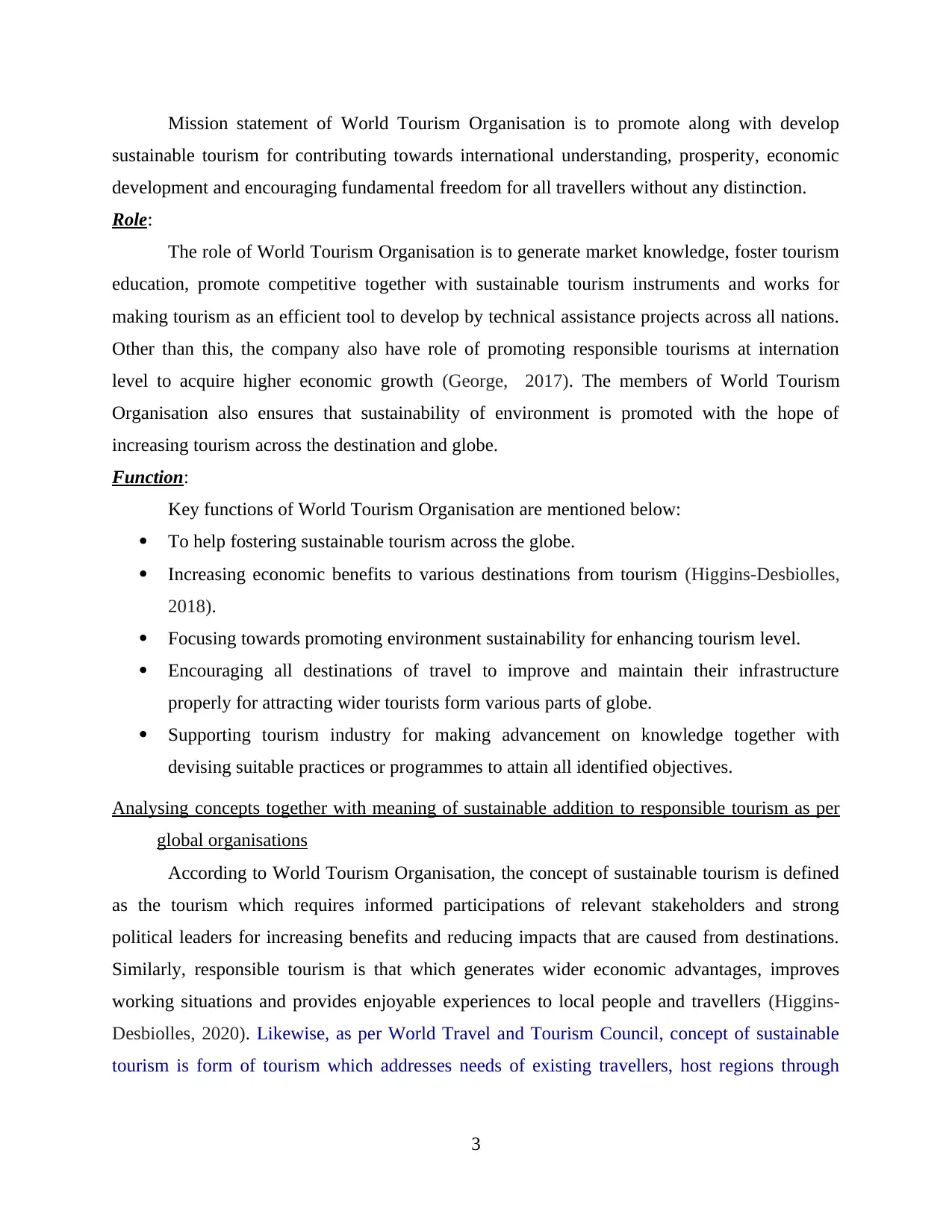
Mission statement of World Tourism Organisation is to promote along with develop
sustainable tourism for contributing towards international understanding, prosperity, economic
development and encouraging fundamental freedom for all travellers without any distinction.
Role:
The role of World Tourism Organisation is to generate market knowledge, foster tourism
education, promote competitive together with sustainable tourism instruments and works for
making tourism as an efficient tool to develop by technical assistance projects across all nations.
Other than this, the company also have role of promoting responsible tourisms at internation
level to acquire higher economic growth (George, 2017). The members of World Tourism
Organisation also ensures that sustainability of environment is promoted with the hope of
increasing tourism across the destination and globe.
Function:
Key functions of World Tourism Organisation are mentioned below:
To help fostering sustainable tourism across the globe.
Increasing economic benefits to various destinations from tourism (Higgins-Desbiolles,
2018).
Focusing towards promoting environment sustainability for enhancing tourism level.
Encouraging all destinations of travel to improve and maintain their infrastructure
properly for attracting wider tourists form various parts of globe.
Supporting tourism industry for making advancement on knowledge together with
devising suitable practices or programmes to attain all identified objectives.
Analysing concepts together with meaning of sustainable addition to responsible tourism as per
global organisations
According to World Tourism Organisation, the concept of sustainable tourism is defined
as the tourism which requires informed participations of relevant stakeholders and strong
political leaders for increasing benefits and reducing impacts that are caused from destinations.
Similarly, responsible tourism is that which generates wider economic advantages, improves
working situations and provides enjoyable experiences to local people and travellers (Higgins-
Desbiolles, 2020). Likewise, as per World Travel and Tourism Council, concept of sustainable
tourism is form of tourism which addresses needs of existing travellers, host regions through
3
sustainable tourism for contributing towards international understanding, prosperity, economic
development and encouraging fundamental freedom for all travellers without any distinction.
Role:
The role of World Tourism Organisation is to generate market knowledge, foster tourism
education, promote competitive together with sustainable tourism instruments and works for
making tourism as an efficient tool to develop by technical assistance projects across all nations.
Other than this, the company also have role of promoting responsible tourisms at internation
level to acquire higher economic growth (George, 2017). The members of World Tourism
Organisation also ensures that sustainability of environment is promoted with the hope of
increasing tourism across the destination and globe.
Function:
Key functions of World Tourism Organisation are mentioned below:
To help fostering sustainable tourism across the globe.
Increasing economic benefits to various destinations from tourism (Higgins-Desbiolles,
2018).
Focusing towards promoting environment sustainability for enhancing tourism level.
Encouraging all destinations of travel to improve and maintain their infrastructure
properly for attracting wider tourists form various parts of globe.
Supporting tourism industry for making advancement on knowledge together with
devising suitable practices or programmes to attain all identified objectives.
Analysing concepts together with meaning of sustainable addition to responsible tourism as per
global organisations
According to World Tourism Organisation, the concept of sustainable tourism is defined
as the tourism which requires informed participations of relevant stakeholders and strong
political leaders for increasing benefits and reducing impacts that are caused from destinations.
Similarly, responsible tourism is that which generates wider economic advantages, improves
working situations and provides enjoyable experiences to local people and travellers (Higgins-
Desbiolles, 2020). Likewise, as per World Travel and Tourism Council, concept of sustainable
tourism is form of tourism which addresses needs of existing travellers, host regions through
3
⊘ This is a preview!⊘
Do you want full access?
Subscribe today to unlock all pages.

Trusted by 1+ million students worldwide
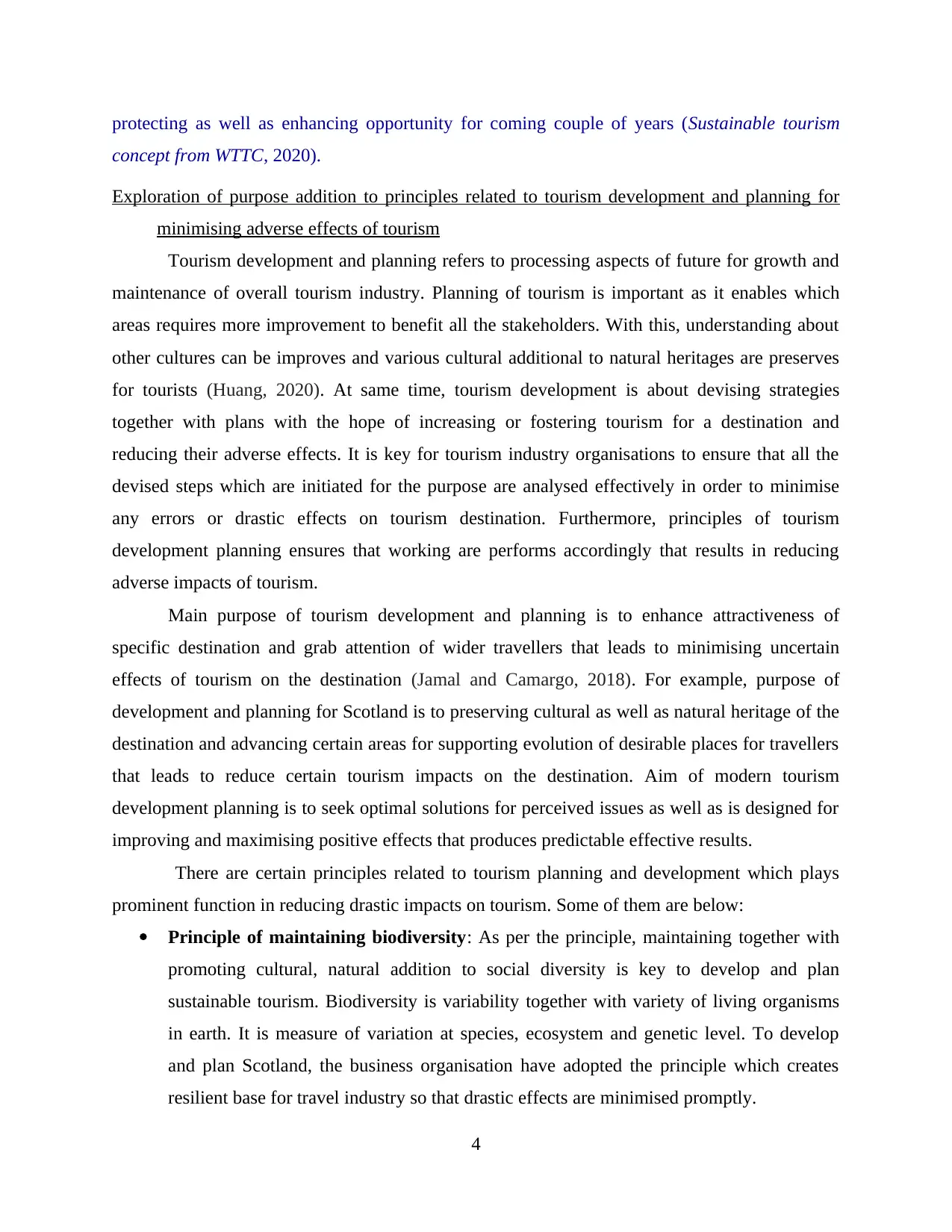
protecting as well as enhancing opportunity for coming couple of years (Sustainable tourism
concept from WTTC, 2020).
Exploration of purpose addition to principles related to tourism development and planning for
minimising adverse effects of tourism
Tourism development and planning refers to processing aspects of future for growth and
maintenance of overall tourism industry. Planning of tourism is important as it enables which
areas requires more improvement to benefit all the stakeholders. With this, understanding about
other cultures can be improves and various cultural additional to natural heritages are preserves
for tourists (Huang, 2020). At same time, tourism development is about devising strategies
together with plans with the hope of increasing or fostering tourism for a destination and
reducing their adverse effects. It is key for tourism industry organisations to ensure that all the
devised steps which are initiated for the purpose are analysed effectively in order to minimise
any errors or drastic effects on tourism destination. Furthermore, principles of tourism
development planning ensures that working are performs accordingly that results in reducing
adverse impacts of tourism.
Main purpose of tourism development and planning is to enhance attractiveness of
specific destination and grab attention of wider travellers that leads to minimising uncertain
effects of tourism on the destination (Jamal and Camargo, 2018). For example, purpose of
development and planning for Scotland is to preserving cultural as well as natural heritage of the
destination and advancing certain areas for supporting evolution of desirable places for travellers
that leads to reduce certain tourism impacts on the destination. Aim of modern tourism
development planning is to seek optimal solutions for perceived issues as well as is designed for
improving and maximising positive effects that produces predictable effective results.
There are certain principles related to tourism planning and development which plays
prominent function in reducing drastic impacts on tourism. Some of them are below:
Principle of maintaining biodiversity: As per the principle, maintaining together with
promoting cultural, natural addition to social diversity is key to develop and plan
sustainable tourism. Biodiversity is variability together with variety of living organisms
in earth. It is measure of variation at species, ecosystem and genetic level. To develop
and plan Scotland, the business organisation have adopted the principle which creates
resilient base for travel industry so that drastic effects are minimised promptly.
4
concept from WTTC, 2020).
Exploration of purpose addition to principles related to tourism development and planning for
minimising adverse effects of tourism
Tourism development and planning refers to processing aspects of future for growth and
maintenance of overall tourism industry. Planning of tourism is important as it enables which
areas requires more improvement to benefit all the stakeholders. With this, understanding about
other cultures can be improves and various cultural additional to natural heritages are preserves
for tourists (Huang, 2020). At same time, tourism development is about devising strategies
together with plans with the hope of increasing or fostering tourism for a destination and
reducing their adverse effects. It is key for tourism industry organisations to ensure that all the
devised steps which are initiated for the purpose are analysed effectively in order to minimise
any errors or drastic effects on tourism destination. Furthermore, principles of tourism
development planning ensures that working are performs accordingly that results in reducing
adverse impacts of tourism.
Main purpose of tourism development and planning is to enhance attractiveness of
specific destination and grab attention of wider travellers that leads to minimising uncertain
effects of tourism on the destination (Jamal and Camargo, 2018). For example, purpose of
development and planning for Scotland is to preserving cultural as well as natural heritage of the
destination and advancing certain areas for supporting evolution of desirable places for travellers
that leads to reduce certain tourism impacts on the destination. Aim of modern tourism
development planning is to seek optimal solutions for perceived issues as well as is designed for
improving and maximising positive effects that produces predictable effective results.
There are certain principles related to tourism planning and development which plays
prominent function in reducing drastic impacts on tourism. Some of them are below:
Principle of maintaining biodiversity: As per the principle, maintaining together with
promoting cultural, natural addition to social diversity is key to develop and plan
sustainable tourism. Biodiversity is variability together with variety of living organisms
in earth. It is measure of variation at species, ecosystem and genetic level. To develop
and plan Scotland, the business organisation have adopted the principle which creates
resilient base for travel industry so that drastic effects are minimised promptly.
4
Paraphrase This Document
Need a fresh take? Get an instant paraphrase of this document with our AI Paraphraser
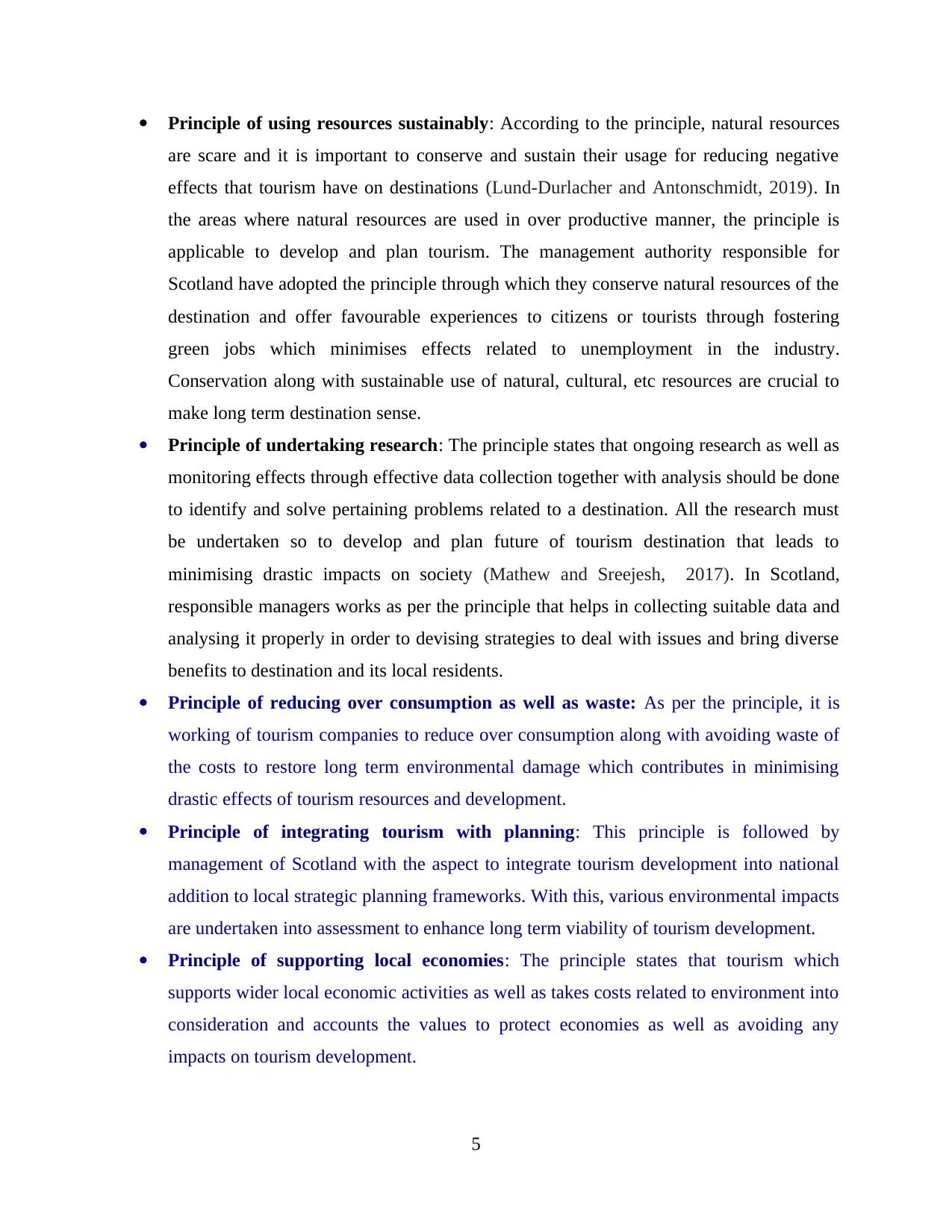
Principle of using resources sustainably: According to the principle, natural resources
are scare and it is important to conserve and sustain their usage for reducing negative
effects that tourism have on destinations (Lund-Durlacher and Antonschmidt, 2019). In
the areas where natural resources are used in over productive manner, the principle is
applicable to develop and plan tourism. The management authority responsible for
Scotland have adopted the principle through which they conserve natural resources of the
destination and offer favourable experiences to citizens or tourists through fostering
green jobs which minimises effects related to unemployment in the industry.
Conservation along with sustainable use of natural, cultural, etc resources are crucial to
make long term destination sense.
Principle of undertaking research: The principle states that ongoing research as well as
monitoring effects through effective data collection together with analysis should be done
to identify and solve pertaining problems related to a destination. All the research must
be undertaken so to develop and plan future of tourism destination that leads to
minimising drastic impacts on society (Mathew and Sreejesh, 2017). In Scotland,
responsible managers works as per the principle that helps in collecting suitable data and
analysing it properly in order to devising strategies to deal with issues and bring diverse
benefits to destination and its local residents.
Principle of reducing over consumption as well as waste: As per the principle, it is
working of tourism companies to reduce over consumption along with avoiding waste of
the costs to restore long term environmental damage which contributes in minimising
drastic effects of tourism resources and development.
Principle of integrating tourism with planning: This principle is followed by
management of Scotland with the aspect to integrate tourism development into national
addition to local strategic planning frameworks. With this, various environmental impacts
are undertaken into assessment to enhance long term viability of tourism development.
Principle of supporting local economies: The principle states that tourism which
supports wider local economic activities as well as takes costs related to environment into
consideration and accounts the values to protect economies as well as avoiding any
impacts on tourism development.
5
are scare and it is important to conserve and sustain their usage for reducing negative
effects that tourism have on destinations (Lund-Durlacher and Antonschmidt, 2019). In
the areas where natural resources are used in over productive manner, the principle is
applicable to develop and plan tourism. The management authority responsible for
Scotland have adopted the principle through which they conserve natural resources of the
destination and offer favourable experiences to citizens or tourists through fostering
green jobs which minimises effects related to unemployment in the industry.
Conservation along with sustainable use of natural, cultural, etc resources are crucial to
make long term destination sense.
Principle of undertaking research: The principle states that ongoing research as well as
monitoring effects through effective data collection together with analysis should be done
to identify and solve pertaining problems related to a destination. All the research must
be undertaken so to develop and plan future of tourism destination that leads to
minimising drastic impacts on society (Mathew and Sreejesh, 2017). In Scotland,
responsible managers works as per the principle that helps in collecting suitable data and
analysing it properly in order to devising strategies to deal with issues and bring diverse
benefits to destination and its local residents.
Principle of reducing over consumption as well as waste: As per the principle, it is
working of tourism companies to reduce over consumption along with avoiding waste of
the costs to restore long term environmental damage which contributes in minimising
drastic effects of tourism resources and development.
Principle of integrating tourism with planning: This principle is followed by
management of Scotland with the aspect to integrate tourism development into national
addition to local strategic planning frameworks. With this, various environmental impacts
are undertaken into assessment to enhance long term viability of tourism development.
Principle of supporting local economies: The principle states that tourism which
supports wider local economic activities as well as takes costs related to environment into
consideration and accounts the values to protect economies as well as avoiding any
impacts on tourism development.
5
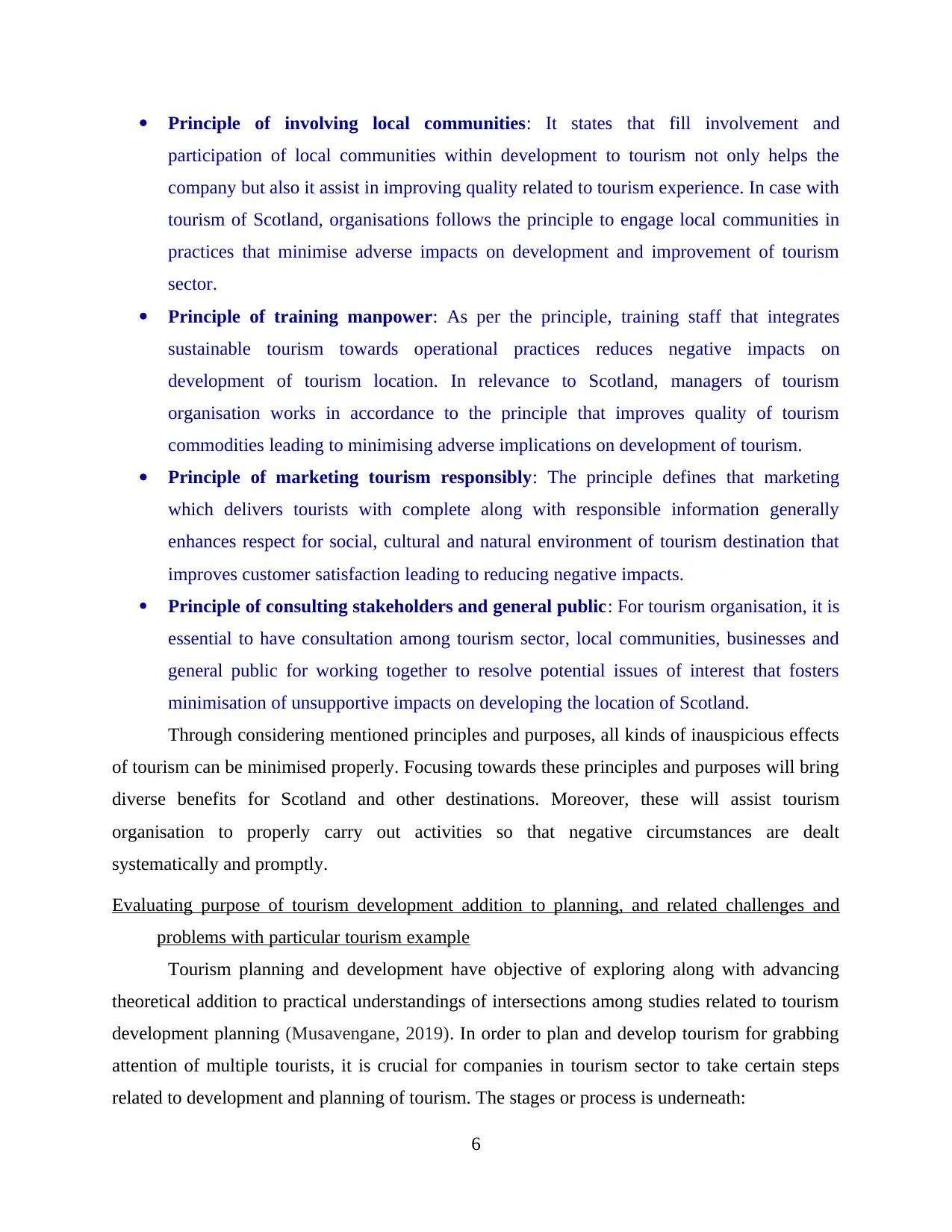
Principle of involving local communities: It states that fill involvement and
participation of local communities within development to tourism not only helps the
company but also it assist in improving quality related to tourism experience. In case with
tourism of Scotland, organisations follows the principle to engage local communities in
practices that minimise adverse impacts on development and improvement of tourism
sector.
Principle of training manpower: As per the principle, training staff that integrates
sustainable tourism towards operational practices reduces negative impacts on
development of tourism location. In relevance to Scotland, managers of tourism
organisation works in accordance to the principle that improves quality of tourism
commodities leading to minimising adverse implications on development of tourism.
Principle of marketing tourism responsibly: The principle defines that marketing
which delivers tourists with complete along with responsible information generally
enhances respect for social, cultural and natural environment of tourism destination that
improves customer satisfaction leading to reducing negative impacts.
Principle of consulting stakeholders and general public: For tourism organisation, it is
essential to have consultation among tourism sector, local communities, businesses and
general public for working together to resolve potential issues of interest that fosters
minimisation of unsupportive impacts on developing the location of Scotland.
Through considering mentioned principles and purposes, all kinds of inauspicious effects
of tourism can be minimised properly. Focusing towards these principles and purposes will bring
diverse benefits for Scotland and other destinations. Moreover, these will assist tourism
organisation to properly carry out activities so that negative circumstances are dealt
systematically and promptly.
Evaluating purpose of tourism development addition to planning, and related challenges and
problems with particular tourism example
Tourism planning and development have objective of exploring along with advancing
theoretical addition to practical understandings of intersections among studies related to tourism
development planning (Musavengane, 2019). In order to plan and develop tourism for grabbing
attention of multiple tourists, it is crucial for companies in tourism sector to take certain steps
related to development and planning of tourism. The stages or process is underneath:
6
participation of local communities within development to tourism not only helps the
company but also it assist in improving quality related to tourism experience. In case with
tourism of Scotland, organisations follows the principle to engage local communities in
practices that minimise adverse impacts on development and improvement of tourism
sector.
Principle of training manpower: As per the principle, training staff that integrates
sustainable tourism towards operational practices reduces negative impacts on
development of tourism location. In relevance to Scotland, managers of tourism
organisation works in accordance to the principle that improves quality of tourism
commodities leading to minimising adverse implications on development of tourism.
Principle of marketing tourism responsibly: The principle defines that marketing
which delivers tourists with complete along with responsible information generally
enhances respect for social, cultural and natural environment of tourism destination that
improves customer satisfaction leading to reducing negative impacts.
Principle of consulting stakeholders and general public: For tourism organisation, it is
essential to have consultation among tourism sector, local communities, businesses and
general public for working together to resolve potential issues of interest that fosters
minimisation of unsupportive impacts on developing the location of Scotland.
Through considering mentioned principles and purposes, all kinds of inauspicious effects
of tourism can be minimised properly. Focusing towards these principles and purposes will bring
diverse benefits for Scotland and other destinations. Moreover, these will assist tourism
organisation to properly carry out activities so that negative circumstances are dealt
systematically and promptly.
Evaluating purpose of tourism development addition to planning, and related challenges and
problems with particular tourism example
Tourism planning and development have objective of exploring along with advancing
theoretical addition to practical understandings of intersections among studies related to tourism
development planning (Musavengane, 2019). In order to plan and develop tourism for grabbing
attention of multiple tourists, it is crucial for companies in tourism sector to take certain steps
related to development and planning of tourism. The stages or process is underneath:
6
⊘ This is a preview!⊘
Do you want full access?
Subscribe today to unlock all pages.

Trusted by 1+ million students worldwide
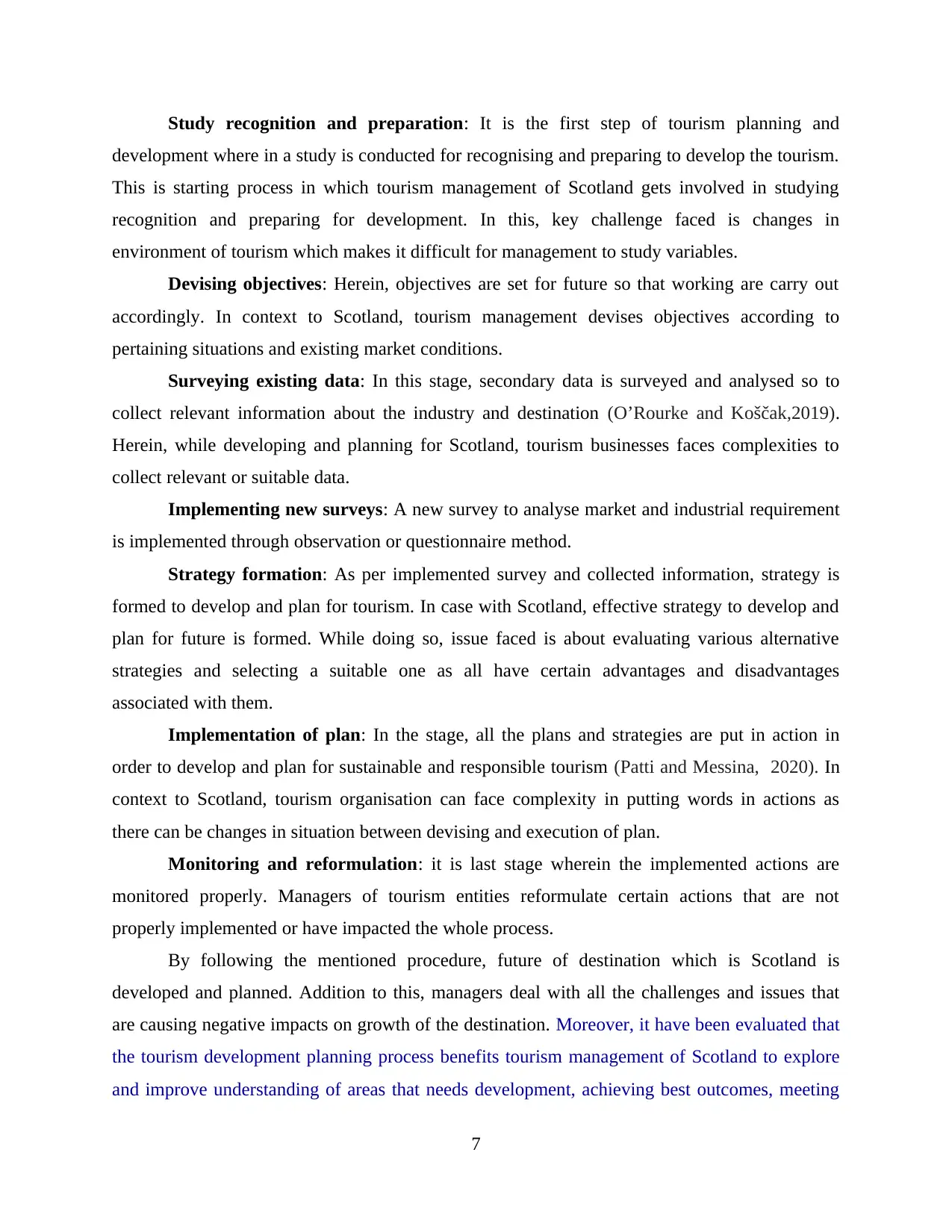
Study recognition and preparation: It is the first step of tourism planning and
development where in a study is conducted for recognising and preparing to develop the tourism.
This is starting process in which tourism management of Scotland gets involved in studying
recognition and preparing for development. In this, key challenge faced is changes in
environment of tourism which makes it difficult for management to study variables.
Devising objectives: Herein, objectives are set for future so that working are carry out
accordingly. In context to Scotland, tourism management devises objectives according to
pertaining situations and existing market conditions.
Surveying existing data: In this stage, secondary data is surveyed and analysed so to
collect relevant information about the industry and destination (O’Rourke and Koščak,2019).
Herein, while developing and planning for Scotland, tourism businesses faces complexities to
collect relevant or suitable data.
Implementing new surveys: A new survey to analyse market and industrial requirement
is implemented through observation or questionnaire method.
Strategy formation: As per implemented survey and collected information, strategy is
formed to develop and plan for tourism. In case with Scotland, effective strategy to develop and
plan for future is formed. While doing so, issue faced is about evaluating various alternative
strategies and selecting a suitable one as all have certain advantages and disadvantages
associated with them.
Implementation of plan: In the stage, all the plans and strategies are put in action in
order to develop and plan for sustainable and responsible tourism (Patti and Messina, 2020). In
context to Scotland, tourism organisation can face complexity in putting words in actions as
there can be changes in situation between devising and execution of plan.
Monitoring and reformulation: it is last stage wherein the implemented actions are
monitored properly. Managers of tourism entities reformulate certain actions that are not
properly implemented or have impacted the whole process.
By following the mentioned procedure, future of destination which is Scotland is
developed and planned. Addition to this, managers deal with all the challenges and issues that
are causing negative impacts on growth of the destination. Moreover, it have been evaluated that
the tourism development planning process benefits tourism management of Scotland to explore
and improve understanding of areas that needs development, achieving best outcomes, meeting
7
development where in a study is conducted for recognising and preparing to develop the tourism.
This is starting process in which tourism management of Scotland gets involved in studying
recognition and preparing for development. In this, key challenge faced is changes in
environment of tourism which makes it difficult for management to study variables.
Devising objectives: Herein, objectives are set for future so that working are carry out
accordingly. In context to Scotland, tourism management devises objectives according to
pertaining situations and existing market conditions.
Surveying existing data: In this stage, secondary data is surveyed and analysed so to
collect relevant information about the industry and destination (O’Rourke and Koščak,2019).
Herein, while developing and planning for Scotland, tourism businesses faces complexities to
collect relevant or suitable data.
Implementing new surveys: A new survey to analyse market and industrial requirement
is implemented through observation or questionnaire method.
Strategy formation: As per implemented survey and collected information, strategy is
formed to develop and plan for tourism. In case with Scotland, effective strategy to develop and
plan for future is formed. While doing so, issue faced is about evaluating various alternative
strategies and selecting a suitable one as all have certain advantages and disadvantages
associated with them.
Implementation of plan: In the stage, all the plans and strategies are put in action in
order to develop and plan for sustainable and responsible tourism (Patti and Messina, 2020). In
context to Scotland, tourism organisation can face complexity in putting words in actions as
there can be changes in situation between devising and execution of plan.
Monitoring and reformulation: it is last stage wherein the implemented actions are
monitored properly. Managers of tourism entities reformulate certain actions that are not
properly implemented or have impacted the whole process.
By following the mentioned procedure, future of destination which is Scotland is
developed and planned. Addition to this, managers deal with all the challenges and issues that
are causing negative impacts on growth of the destination. Moreover, it have been evaluated that
the tourism development planning process benefits tourism management of Scotland to explore
and improve understanding of areas that needs development, achieving best outcomes, meeting
7
Paraphrase This Document
Need a fresh take? Get an instant paraphrase of this document with our AI Paraphraser
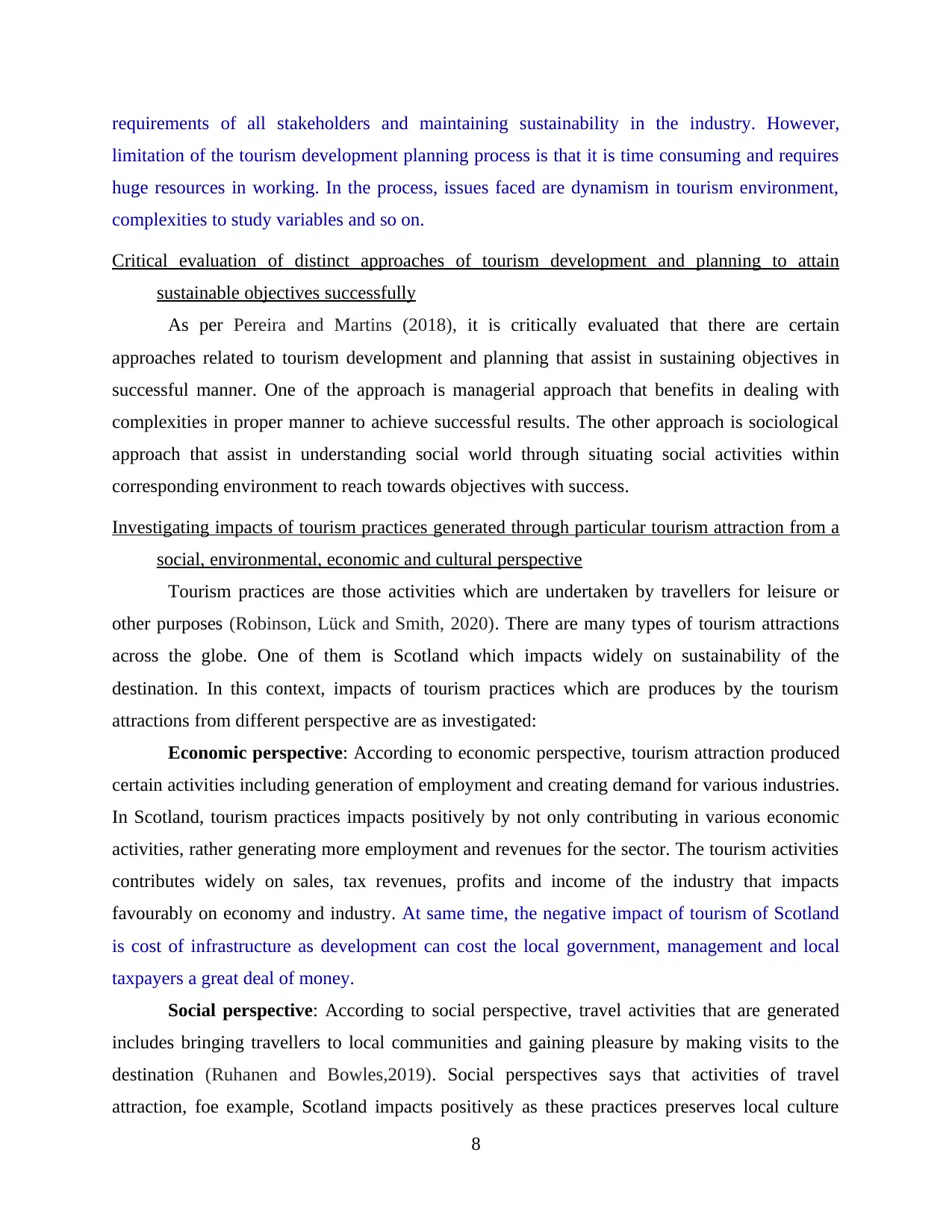
requirements of all stakeholders and maintaining sustainability in the industry. However,
limitation of the tourism development planning process is that it is time consuming and requires
huge resources in working. In the process, issues faced are dynamism in tourism environment,
complexities to study variables and so on.
Critical evaluation of distinct approaches of tourism development and planning to attain
sustainable objectives successfully
As per Pereira and Martins (2018), it is critically evaluated that there are certain
approaches related to tourism development and planning that assist in sustaining objectives in
successful manner. One of the approach is managerial approach that benefits in dealing with
complexities in proper manner to achieve successful results. The other approach is sociological
approach that assist in understanding social world through situating social activities within
corresponding environment to reach towards objectives with success.
Investigating impacts of tourism practices generated through particular tourism attraction from a
social, environmental, economic and cultural perspective
Tourism practices are those activities which are undertaken by travellers for leisure or
other purposes (Robinson, Lück and Smith, 2020). There are many types of tourism attractions
across the globe. One of them is Scotland which impacts widely on sustainability of the
destination. In this context, impacts of tourism practices which are produces by the tourism
attractions from different perspective are as investigated:
Economic perspective: According to economic perspective, tourism attraction produced
certain activities including generation of employment and creating demand for various industries.
In Scotland, tourism practices impacts positively by not only contributing in various economic
activities, rather generating more employment and revenues for the sector. The tourism activities
contributes widely on sales, tax revenues, profits and income of the industry that impacts
favourably on economy and industry. At same time, the negative impact of tourism of Scotland
is cost of infrastructure as development can cost the local government, management and local
taxpayers a great deal of money.
Social perspective: According to social perspective, travel activities that are generated
includes bringing travellers to local communities and gaining pleasure by making visits to the
destination (Ruhanen and Bowles,2019). Social perspectives says that activities of travel
attraction, foe example, Scotland impacts positively as these practices preserves local culture
8
limitation of the tourism development planning process is that it is time consuming and requires
huge resources in working. In the process, issues faced are dynamism in tourism environment,
complexities to study variables and so on.
Critical evaluation of distinct approaches of tourism development and planning to attain
sustainable objectives successfully
As per Pereira and Martins (2018), it is critically evaluated that there are certain
approaches related to tourism development and planning that assist in sustaining objectives in
successful manner. One of the approach is managerial approach that benefits in dealing with
complexities in proper manner to achieve successful results. The other approach is sociological
approach that assist in understanding social world through situating social activities within
corresponding environment to reach towards objectives with success.
Investigating impacts of tourism practices generated through particular tourism attraction from a
social, environmental, economic and cultural perspective
Tourism practices are those activities which are undertaken by travellers for leisure or
other purposes (Robinson, Lück and Smith, 2020). There are many types of tourism attractions
across the globe. One of them is Scotland which impacts widely on sustainability of the
destination. In this context, impacts of tourism practices which are produces by the tourism
attractions from different perspective are as investigated:
Economic perspective: According to economic perspective, tourism attraction produced
certain activities including generation of employment and creating demand for various industries.
In Scotland, tourism practices impacts positively by not only contributing in various economic
activities, rather generating more employment and revenues for the sector. The tourism activities
contributes widely on sales, tax revenues, profits and income of the industry that impacts
favourably on economy and industry. At same time, the negative impact of tourism of Scotland
is cost of infrastructure as development can cost the local government, management and local
taxpayers a great deal of money.
Social perspective: According to social perspective, travel activities that are generated
includes bringing travellers to local communities and gaining pleasure by making visits to the
destination (Ruhanen and Bowles,2019). Social perspectives says that activities of travel
attraction, foe example, Scotland impacts positively as these practices preserves local culture
8
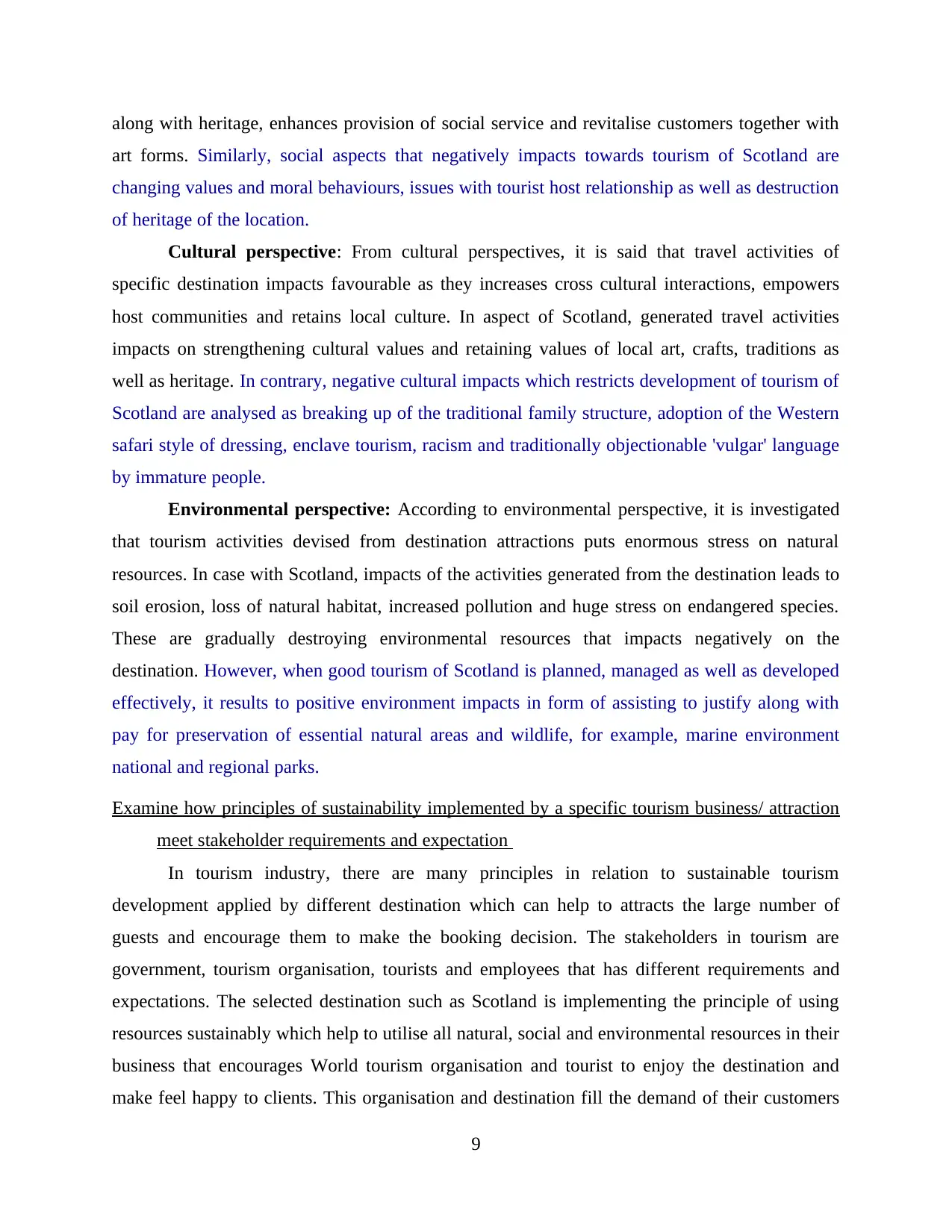
along with heritage, enhances provision of social service and revitalise customers together with
art forms. Similarly, social aspects that negatively impacts towards tourism of Scotland are
changing values and moral behaviours, issues with tourist host relationship as well as destruction
of heritage of the location.
Cultural perspective: From cultural perspectives, it is said that travel activities of
specific destination impacts favourable as they increases cross cultural interactions, empowers
host communities and retains local culture. In aspect of Scotland, generated travel activities
impacts on strengthening cultural values and retaining values of local art, crafts, traditions as
well as heritage. In contrary, negative cultural impacts which restricts development of tourism of
Scotland are analysed as breaking up of the traditional family structure, adoption of the Western
safari style of dressing, enclave tourism, racism and traditionally objectionable 'vulgar' language
by immature people.
Environmental perspective: According to environmental perspective, it is investigated
that tourism activities devised from destination attractions puts enormous stress on natural
resources. In case with Scotland, impacts of the activities generated from the destination leads to
soil erosion, loss of natural habitat, increased pollution and huge stress on endangered species.
These are gradually destroying environmental resources that impacts negatively on the
destination. However, when good tourism of Scotland is planned, managed as well as developed
effectively, it results to positive environment impacts in form of assisting to justify along with
pay for preservation of essential natural areas and wildlife, for example, marine environment
national and regional parks.
Examine how principles of sustainability implemented by a specific tourism business/ attraction
meet stakeholder requirements and expectation
In tourism industry, there are many principles in relation to sustainable tourism
development applied by different destination which can help to attracts the large number of
guests and encourage them to make the booking decision. The stakeholders in tourism are
government, tourism organisation, tourists and employees that has different requirements and
expectations. The selected destination such as Scotland is implementing the principle of using
resources sustainably which help to utilise all natural, social and environmental resources in their
business that encourages World tourism organisation and tourist to enjoy the destination and
make feel happy to clients. This organisation and destination fill the demand of their customers
9
art forms. Similarly, social aspects that negatively impacts towards tourism of Scotland are
changing values and moral behaviours, issues with tourist host relationship as well as destruction
of heritage of the location.
Cultural perspective: From cultural perspectives, it is said that travel activities of
specific destination impacts favourable as they increases cross cultural interactions, empowers
host communities and retains local culture. In aspect of Scotland, generated travel activities
impacts on strengthening cultural values and retaining values of local art, crafts, traditions as
well as heritage. In contrary, negative cultural impacts which restricts development of tourism of
Scotland are analysed as breaking up of the traditional family structure, adoption of the Western
safari style of dressing, enclave tourism, racism and traditionally objectionable 'vulgar' language
by immature people.
Environmental perspective: According to environmental perspective, it is investigated
that tourism activities devised from destination attractions puts enormous stress on natural
resources. In case with Scotland, impacts of the activities generated from the destination leads to
soil erosion, loss of natural habitat, increased pollution and huge stress on endangered species.
These are gradually destroying environmental resources that impacts negatively on the
destination. However, when good tourism of Scotland is planned, managed as well as developed
effectively, it results to positive environment impacts in form of assisting to justify along with
pay for preservation of essential natural areas and wildlife, for example, marine environment
national and regional parks.
Examine how principles of sustainability implemented by a specific tourism business/ attraction
meet stakeholder requirements and expectation
In tourism industry, there are many principles in relation to sustainable tourism
development applied by different destination which can help to attracts the large number of
guests and encourage them to make the booking decision. The stakeholders in tourism are
government, tourism organisation, tourists and employees that has different requirements and
expectations. The selected destination such as Scotland is implementing the principle of using
resources sustainably which help to utilise all natural, social and environmental resources in their
business that encourages World tourism organisation and tourist to enjoy the destination and
make feel happy to clients. This organisation and destination fill the demand of their customers
9
⊘ This is a preview!⊘
Do you want full access?
Subscribe today to unlock all pages.

Trusted by 1+ million students worldwide
1 out of 17
Related Documents
Your All-in-One AI-Powered Toolkit for Academic Success.
+13062052269
info@desklib.com
Available 24*7 on WhatsApp / Email
![[object Object]](/_next/static/media/star-bottom.7253800d.svg)
Unlock your academic potential
Copyright © 2020–2026 A2Z Services. All Rights Reserved. Developed and managed by ZUCOL.





